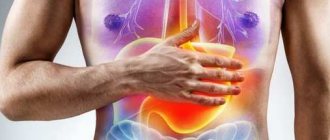Digestive disorders occur in almost every person from time to time, to a greater or lesser extent of their manifestation. Abdominal bloating coupled with nausea, vomiting, dizziness, weakness, low-grade or high body temperature can signal either a temporary digestive disorder caused by taking medications, certain foods or the ingestion of toxic substances into the body, or the presence of a dangerous disease that requires urgent medical intervention.
This article, dedicated to diagnosing the causes of nausea and flatulence, as well as methods of dealing with the mentioned symptoms, will help you determine what exactly provoked the sharp deterioration of your condition, why you feel sick and have a bloated stomach, and also choose the best way to eliminate the problem.
Digestive disorders of various types are inherent in almost every person, the only question is to what extent this occurs. Some people often suffer from symptoms of a disorder in the general digestive process, they often or periodically experience symptoms of nausea or nausea, bowel problems (diarrhea (diarrhea) or constipation), belching or heartburn, bloating in the abdomen, flatulence (increased gas production), weakness, increased fatigue or general pain in the stomach or intestines, while others experience such symptoms very rarely. Further in the article, we will go into detail about why you may feel nauseous, sick, or nauseous against the background of bloating in the abdomen and increased gas formation (flatulence), what it can be, for what reasons it appears and how to cope with such a problem.
Causes of nausea, weakness, why the stomach is bloated
Many are concerned about the question of what could happen if there is bloating in the abdomen and dizziness, nausea and flatulence, what is associated with the appearance of these symptoms. According to doctors, increased gas formation, nausea, weakness and bloating in the abdomen are a consequence of:
1 taking certain types of medications that have a negative effect on the organs of the digestive system (iron-containing, antiviral, antibacterial, antiparasitic, anti-inflammatory, hormonal drugs);
2 untimely meals (for the body to function smoothly, you need to eat five to six times a day, and the size of one serving should not exceed the contents of folded palms: someone who systematically overeats, eats sporadically, or abstains from food for a long time period of time (fasting), risks gastritis, cholelithiasis, pancreatitis - diseases that cause bloating, nausea and increased gas formation);
3 alcohol, chemical, nutritional (food), drug intoxication;
4 parasitic infestations;
5 pregnancy;
6 intense impact on the vestibular apparatus;
7 allergic reaction;
8 intestinal dysbiosis.
At the same time, weakness and nausea (feeling sick) can serve as harbingers of much more serious disorders that require urgent medical intervention:
1 Appendicitis - severe nausea and pain in the right lower abdomen (sometimes pulling, aching, sharp and severe cramping pain in the abdomen can begin in another part of the abdomen). Appendicitis or inflammation of the appendix: the inflammatory process in the appendix of the cecum is usually accompanied by bloating, acute or burning pain in the area below the navel, stiffness of the abdominal muscles, flatulence, nausea, vomiting, fever, dizziness. Appendicitis is treated exclusively surgically, and the sooner the inflamed appendix is cut out, the better for the person - thanks to this, it is possible to avoid the development of such life-threatening complications as peritonitis and sepsis.
2 Pancreatitis or cholecystitis - pain in the area of the right hypochondrium, belching, heartburn, a feeling as if sick (with cholecystitis) and left-sided pain in the area of the left hypochondrium with pancreatitis: a deficiency of enzymes produced by the pancreas and stagnation of the contents of the gallbladder can cause inflammation of these organs , against the background of which symptoms such as nausea, flatulence, upset stool, and abdominal pain of a girdle or stabbing nature may appear. If the inflammatory process during pancreatitis or cholecystitis is not eliminated in time, the organs can be seriously damaged, which is why at the first signs of pancreatitis or cholecystitis (bloating in the stomach, increased gas formation, pain in the right side or the area above the navel), you must immediately go to the hospital and undergo examination by a gastroenterologist.
3 Intestinal obstruction and severe pain in the intestinal area, lower abdomen: blocking the intestinal lumen with a solid object, tumor or “leaf” formed from connective tissue (adhesion) is considered an extremely life-threatening phenomenon. The fact is that the resulting barrier prevents the movement of food along the organ, which is why it begins to rot and poison the body with the products of its decay. In addition, due to the “plug”, feces do not come out, but remain inside, which cannot but affect a person’s general well-being. Since intestinal obstruction is treated exclusively surgically, it is important to recognize the symptoms of the pathology in time (constipation and severe bloating in the abdomen, vomiting, high fever, intestinal spasms and colic) and go to the hospital. Delay in this situation is not welcome: a wait-and-see attitude is fraught with death.
4 Gastritis: sour or rotten belching, stomach pain in the affected area, bloating and nausea that occurs after eating, coupled with “hunger” pain, flatulence, a feeling of heaviness in the stomach may indicate inflammation of the gastric mucosa caused by changes in acidity parameters gastric juice, consuming too hot food or drinks, or the activity of pathogens, in particular the bacteria Helicobacter Pylori. Gastritis can provoke peptic ulcers and even stomach cancer, which is why it needs to be treated in a timely manner - without waiting until the condition worsens to such an extent that urgent hospitalization is required.
5 Reflux: heartburn, bloating in the abdomen without gas, burning in the esophagus, flatulence, nausea, stomach pain are characteristic symptoms of reflux. This pathology, which involves the reflux of stomach contents back into the esophagus, is insidious - because of it, a person can develop cancer of the larynx or esophagus. In order not to encounter such a complication, you must follow certain rules - you can familiarize yourself with them at an appointment with a gastroenterologist.
It should be noted that in children, flatulence and nausea occur many times more often than in adults, due to weak, not fully formed immunity. They endure attacks by pathogenic microorganisms, parasites and changes in diet quite hard and take longer to recover after treatment.
Hard belly in the stomach area
This effect - the rigidity of the muscle fibers surrounding the peritoneum, has more than one cause and factors that cause it. So, why do people have a hard stomach?
Gas and indigestion
To eliminate bloating, it is necessary to accurately determine its cause.
One of the reasons may be a lack of enzymes in the body, which is why some foods (milk and flour products) are not digested.
.
Another reason may be too rapid absorption of food (during which a significant amount of air enters the digestive tract), which naturally causes bloating.
Methods to combat such inconveniences are quite simple: limit baked goods and pure milk products in your daily diet. It would be more advisable to consume milk in a sour state, or to help the body with pharmaceutical preparations based on animal enzymes
.
And remember: there is no need to rush at the dinner table, chew your food thoroughly and do not drink water for one hour.
When the abdomen is bloated, a banal enema often has a positive effect. You just need to: take a heating pad, fill it with water at room temperature, hang it higher (so that the water flows down under its own pressure), insert the end of the hose coming out of the heating pad into the rectum and, at the first urge to defecate, go to the toilet. This method allows you to cleanse the intestines and get rid of gas formation.
In some cases, a hard belly may indicate poisoning or pathology of the body.
Disorders that cause hardening of the abdomen:
Abdominal pain: caused by an attack of appendicitis, perforated gastric ulcer, ectopic pregnancy, defect of a large blood vessel in the abdominal region;
Abscess in the abdominal cavity;
Diseases of the gallbladder and the presence of stones in it;
Some abdominal injuries;
Benign and malignant neoplasms.
Hardening of the abdomen during pregnancy
A hard belly in expectant mothers is quite common. This can affect fatigue and stress, which leads to uterine tone. In such cases, it is recommended to relax and relieve emotional stress (for example: relaxing music)
.
If the situation still does not change for the better, do not put off calling an ambulance for a long time.
.
Indeed, in the early stages of pregnancy, too active uterine tone can lead to an unwanted miscarriage
.
This is due to the fact that uterine contractions disrupt blood flow in the placenta, thereby causing a threatening oxygen deficiency in the fetus.
If a person observes the effect of a hard belly, then, of course, it would be useful to contact a specialist. This is necessary in order to exclude any hint of a terrible disease.
Diagnostics
In a medical institution, the patient will undergo the following examination procedure:
General examination (history collection and palpation of the abdominal area);
Blood chemistry;
Urine and stool tests;
Ultrasound examination of the organs of the retroperitoneal space and abdominal cavity;
Examination of the intestines and stomach using barium;
And also a chest x-ray.
Based on the results obtained during the study, the doctor makes a diagnosis and prescribes adequate treatment.
Lead a healthy lifestyle! Watch what goes on your table: try as little as possible to consume foods that provoke disturbances in the functioning of the gastrointestinal tract (whole milk, beans, peas, yeast, dough made from wheat flour, carbonated drinks, white cabbage, pears, indigestible fats , mushrooms, spicy snacks and some spices, and also do not overuse pickles). Numerous additives (group E) can become the culprits of unpleasant processes in the intestines, during which pain and gases appear in the stomach.
Treat liver, pancreas and gallbladder diseases in a timely manner. With weak fermentation and low stomach acidity, specialized medications will make your life much easier
.
As popular wisdom says: treat food as medicine, so that later you do not eat medicine as food
. Human health starts from the stomach!
https://aibolita.ru/pischevarenie/1057-pochemu-tverdyy-zhivot-byvaet.html
Read more →
A hard belly can cause discomfort for anyone: men, women, and even children. There are many reasons for this phenomenon. Let's look at the problem of a hard belly in more detail.
Many women complain of heaviness in the abdominal cavity, as if this part of the body suddenly became large, hard and swollen.
But often the cause of trouble is a banal violation of the principles of healthy eating and a passion for heavy fatty foods that are not absorbed by the body.
Are you full of buns? Loaded up on yoghurts? In this case, a hard, puffy bottom most likely means there is a lack of enzymes to digest milk and flour products.
In this case, getting rid of a swollen and hard belly is very simple: remove buns and dairy products from your diet, introduce vegetables into your diet and take special enzymes after meals.
We are treated with an enema! Along with pharmaceutical drugs, an enema is an excellent way to heal a hard stomach. Just fill the pear with water at room temperature: the intestines will quickly clear and you will feel better
. And in order not to cause problems for yourself in the future, and not to ask why everything happened, eat all your food slowly, chewing every bite, and do not wash down your meal with large quantities of water.
It’s another matter if a woman’s lower abdomen becomes hard and swollen in the first weeks of pregnancy. This can be a signal of a dangerous pathology - uterine hypertonicity, which can lead to termination of pregnancy and loss of the child.
At later stages - around 25-27 weeks - a tense and hard abdomen often indicates the beginning of “training contractions” - this is how the body prepares to give birth. And in the last trimester - at 38-39 weeks, this part of the body may become tight and hard (and even hurt a little) due to the proximity of childbirth.
The first months of a baby’s life are the most important. During this period, the newborn may suffer from colic, which he tolerates very hard, knocking his legs and crying bitterly.
The reason for the baby’s belly to bloat, when it becomes tight and hard to the touch, can be explained simply: the baby’s digestive system is not fully formed and has difficulty digesting food, which is why gases constantly accumulate in the intestines.
Helping your baby cope with the problem is not difficult: just give a light massage of the tummy clockwise, do simple exercises by bending and straightening the legs, and give a special medicine for colic. Regular dill water is also a proven and very effective remedy for bloating in infants.
About the benefits of water. Water procedures provide invaluable assistance in the fight against intestinal colic. It has been proven that systematic bathing helps a bloated belly get rid of accumulated gases faster, and colic goes away
. Bathing in water with decoctions of chamomile flowers, string or potassium permanganate has a particularly beneficial effect.
By the age of 40, men very often acquire a large, unsightly belly, which they like to call a “labor callus.” However, work has nothing to do with it
.
Much more often, the reason for the appearance of a huge bloated belly in a representative of the stronger sex is gluttony, addiction to foamy drinks and a sedentary lifestyle.
Diet and exercise in these cases are the best cure for a large “labor blister” that prevents you from leading a full life (including sexual life).
However, it happens that a large, hard abdominal cavity of a person is evidence of pathology and a global malfunction of the body.
Reasons why the stomach becomes stone:
- Attack of appendicitis.
- Stomach ulcer (and even cancer).
- Liver diseases.
- Ectopic pregnancy.
- Disturbances in the functioning of a blood vessel located on the abdominal wall.
- Abcesses.
- Cholelithiasis.
- Peritonitis.
- Oncology.
- Abdominal ascites (edema).
If you lead a healthy lifestyle, but notice that the “stoniness” of your stomach is increasing, and even after a diet it is tight and bloated, do not hesitate to consult a doctor. Any disease, as doctors rightly note, can be effectively treated only in the early stages
. Health to you, beautiful and toned tummies!
https://www.allwomens.ru/43991-tverdyy-zhivot.html
This effect - the rigidity of the muscle fibers surrounding the peritoneum, has more than one cause and factors that cause it. So, why do people have a hard stomach?
Nausea and flatulence as a reason to visit the hospital
Under what conditions is it necessary to urgently go to the hospital? A doctor's help is required if:
1 nausea, bloating in the intestinal area, flatulence are observed over a long period of time;
2 there was an acute pain in the stomach and nausea, the stomach was swollen, which was flat a couple of hours ago;
3 there is a periodic urge to defecate, but feces do not come out;
4 the digestion process is disrupted.
If the above circumstances exist, it is necessary to consult a gastroenterologist in order to exclude the possibility of pathologies that pose a threat to life and health.
How to remove hard belly in men – Bluecloud Solutions
Many women complain of heaviness in the abdominal cavity, as if this part of the body suddenly became large, hard and swollen. But often the cause of trouble is a banal violation of the principles of healthy eating and a passion for heavy fatty foods that are not absorbed by the body.
Are you full of buns? Loaded up on yoghurts? In this case, a hard, puffy bottom most likely means there is a lack of enzymes to digest milk and flour products.
In this case, getting rid of a swollen and hard belly is very simple: remove buns and dairy products from your diet, introduce vegetables into your diet and take special enzymes after meals.
Pathological causes of bloating
Quite often, the human body does not have enough of any enzyme necessary for the high-quality breakdown of food.
As a result, when food that is heavy for a particular person enters the stomach, it is often digested by other parts of the gastrointestinal tract, causing excessive gas formation. The excess gas that appears has a bursting effect on the stomach.
- Abdominal pain - Nausea - Edema - Vomiting - Abdominal abscess - Appendicitis - Cholecystitis caused by gallstones - Gastrointestinal perforation - Abdominal trauma - Peritonitis - Pregnancy
Hard belly during pregnancy
It’s another matter if a woman’s lower abdomen becomes hard and swollen in the first weeks of pregnancy. This can be a signal of a dangerous pathology - uterine hypertonicity, which can lead to termination of pregnancy and loss of the child.
At later stages - around 25-27 weeks - a tense and hard abdomen often indicates the beginning of “training contractions” - this is how the body prepares to give birth. And in the last trimester - at 38-39 weeks, this part of the body may become tight and hard (and even hurt a little) due to the proximity of childbirth.
Diagnosis: why the stomach is hard and hurts
The first thing that always catches your eye is a person who wears clothes that are much larger than necessary and constantly loosens his belt, while feeling discomfort. All these signs are very similar to many similar pathologies.
This is how obese people behave, with asymptomatic ascites and many other similar diseases. Any of the diseases mentioned can smooth out the sensation of pain for a long time, thereby masking itself.
A man has a hard belly
By the age of 40, men very often acquire a large, unsightly belly, which they like to call a “labor callus.” However, work has nothing to do with it.
Much more often, the reason for the appearance of a huge bloated belly in a representative of the stronger sex is gluttony, addiction to foamy drinks and a sedentary lifestyle. Diet and exercise in these cases are the best cure for a large “labor blister” that prevents you from leading a full life (including sexual life).
However, it happens that a large, hard abdominal cavity of a person is evidence of pathology and a global malfunction of the body.
Reasons why the stomach becomes stone:
- Attack of appendicitis.
- Stomach ulcer (and even cancer).
- Liver diseases.
- Ectopic pregnancy.
- Disturbances in the functioning of a blood vessel located on the abdominal wall.
- Abcesses.
- Cholelithiasis.
- Peritonitis.
- Oncology.
- Abdominal ascites (edema).
If you lead a healthy lifestyle, but notice that the “stoniness” of your stomach is increasing, and even after a diet it is tight and bloated, do not hesitate to consult a doctor. Any disease, as doctors rightly note, can be effectively treated only in the early stages. Health to you, beautiful and toned tummies!
www.AllWomens.ru
- Pathological causes of bloating
- Diagnosis: why the stomach is hard and hurts
- Treatment of the disease
If a person's stomach is hard and hurts, they should consult a doctor. Something constantly hurts in the human body and we are already accustomed to it.
Any pain is a sign of some dysfunction in the body. Sometimes the pain is fleeting, then you should not focus on it.
Perhaps you just overate a little. But when the pain becomes prolonged or returns periodically, then this is probably evidence of something more serious and you should consult a doctor.
Most often, patients complain of bloating. This is a rather subjective statement that passes over time. There are complaints about conflicting sensations of a stomach inflated with air and at the same time heaviness in it.
In most cases, such symptoms do not require any medical intervention and go away over time, but in some cases the situation will not be resolved without specific medical measures.
Upon examination, the doctor will immediately point out problems present in the gastrointestinal tract. With proper examination, the doctor will certainly be able to distinguish between them.
If the examination showed the absence of any visible abnormalities in the patient, then the person himself most likely provoked the accumulation of gases in his stomach:
- Haste during eating, when a fair amount of air is swallowed along with food.
- Abuse of carbonated drinks.
- Other similar reasons.
Treatment of the disease
As with any disease of the gastrointestinal tract, the patient’s diet is first adjusted. In this case, all foods associated with increased gas formation must be excluded from the diet. Such products include cabbage, potatoes, rice, milk, and so on.
Their place in the diet is taken by wholemeal bread, fermented milk products and fruits and vegetables, although in very limited quantities.
This should be followed by increased physical activity. Their character is not of fundamental importance.
Source: https://dietologiya.top/prostye-diety/kak-ubrat-tverdyy-zhivot/
Tablets, drugs and medicines if you feel sick and have a bloated stomach
You can get rid of nausea and flatulence with the help of medications and tablets, the choice of which is based on the cause of unpleasant symptoms:
1 In case of acute intoxication of the body, viral or bacterial infection, Nifuroxazide or Furazolidone are usually prescribed. These drugs not only quickly neutralize harmful substances, but also simultaneously restore the functioning of the gastrointestinal tract. These medications are produced in the form of tablets or suspensions, which are taken for ten days. As practice shows, during this time it is possible to completely get rid of symptoms such as vomiting, intestinal spasms, stool upset, flatulence, bloating in the abdomen and a temperature of 37 ° C and above - frequent companions of poisoning and infectious diseases.
2 If nausea and flatulence are caused by a drug overdose, Cerucal will come to the rescue. The main advantages of the drug include low cost (around two hundred rubles) and almost instant results, the disadvantages are numerous contraindications: (tendency to gastrointestinal bleeding; presence of bronchial asthma or epilepsy; intestinal perforation; pregnancy (first trimester); childhood (up to three years); hypersensitivity to the components of the drug; intestinal obstruction; breastfeeding).
3 If flatulence and nausea are caused by eating certain foods or overeating, Espumisan, which acts as an antifoam, will help out. This drug neutralizes the gas released during the digestion of food, due to which the stomach “deflates” and stops hurting. The product does not cause any harm to the body - it can be given even to infants without fear of developing unwanted complications. The only drawback of the drug is its price - Espumisan costs about four hundred rubles.
4 Almagel, which gently envelops the walls of the digestive organs, thereby stimulating the healing of damaged and/or inflamed mucosa, will help cope with unpleasant symptoms arising from exacerbation of diseases of the gastrointestinal tract. Along the way, the product binds toxins, which are then removed naturally. The drug can be used at any age, however, before using it, you should make sure that there are no following contraindications: Alzheimer's disease; chronic renal failure; pregnancy; allergic reaction to one or more of the constituent components; low phosphorus levels in the blood.
If the causes of the feeling of fullness and bloating in the abdomen cannot be identified, you can resort to a broad-spectrum remedy - Smecta. This drug effectively fights both toxins of endogenous and exogenous origin, as well as pathogens that choose the intestines as their habitat. The product can be used to restore the functioning of the digestive system during periods of exacerbation of diseases such as colitis, peptic ulcer, gastritis, esophagitis, duodenitis. More information about how much and for how long the drug should be taken can be found in the instructions that came with it or from the pharmacist.
When should you see a doctor if you have gas?
Rumbling in the stomach and flatulence themselves are usually only signs of minor disturbances in the motility of the stomach and intestines. But if they are accompanied by other symptoms, the doctor will suspect the presence of serious problems with the digestive organs that require treatment. Among the “satellites” of increased gas formation are:
- belching with an unpleasant residual taste in the mouth;
- loss of appetite;
- nausea and vomiting;
- loose stools or vice versa – constipation;
- pain in the abdominal area.
In this case, the causes of bloating, rumbling and flatulence are most likely no longer so harmless. It can be:
- inflammatory reactions in the digestive system;
- infectious, viral or parasitic diseases;
- allergic reactions caused by intolerance to certain foods;
- intoxication with poor quality food and toxic substances;
- disorders of blood circulation and motor function of the digestive organs;
- the presence of physical obstacles in the intestines: adhesions, tumors, foreign objects, accumulations of helminths.
Only a specialist can accurately determine the causes and cure a person. Especially when you consider that women have another reason for increased gas formation - pregnancy.
How to get rid of flatulence, bloating and nausea at home using folk remedies
You can eliminate flatulence coupled with nausea on your own - by using folk remedies that have been used to treat our ancestors from time immemorial. They knew firsthand how to treat bloating in the abdomen at home, because in those distant times there were practically no medicines as such. When such a need arose (a high temperature rose 37, 38, 39 and the stomach was swollen, vomiting, intestinal colic and cramps occurred), they did not use pills for nausea and bloating, but:
1 decoction of dill seeds (one teaspoon of seeds is poured with a glass of boiling water and left for an hour);
2 infusions of chamomile (one tablespoon of flowers or a ready-made filter bag is poured with half a liter of boiling water - when the liquid has cooled, filter the infusion, add mint, cumin or fennel seeds, honey or valerian root and use for its intended purpose);
3 lemon balm infusion (four teaspoons of leaves are poured into a liter of boiling water and infused for two hours - the cooled product is filtered and taken orally in a volume equal to one hundred milliliters, an hour before meals);
4 decoction of St. John's wort (a tablespoon of St. John's wort is poured with boiling water and left for two to three minutes, after which the liquid is drained and immediately taken orally);
5 infusion of parsley roots (thoroughly washed parsley roots are soaked in warm water and placed in a dark, dry place for a day).
These remedies are still relevant - they are used to treat nausea, bloating and flatulence in children, the elderly, people with weakened immune systems, and how many times they have helped pregnant women out is too many to count! As you know, the causes of bloating in the abdomen during pregnancy lie in a sharp change in hormonal levels, as well as taste preferences. Folk remedies allow you to cope with unpleasant symptoms without harm to the mother and fetus; pharmaceutical drugs cannot boast of this. That is why for pregnant women who exhibit symptoms of flatulence, a swollen, bloated stomach and nausea, doctors usually prescribe folk remedies, and not anti-bloating pills that can be bought at the pharmacy - most of them are contraindicated for expectant mothers.
What needs to be done so that these remedies act quickly and do not provoke unwanted, although not dangerous to life and health, complications? If you feel dizzy and feel nauseous, the upper or lower part of the abdomen is full and hurts (the one under the ribs, or the one below the navel), the temperature begins to rise, you should immediately drink one of the remedies mentioned above. The standard course of treatment is ten days, but if necessary, it can be extended to two weeks. During this period, it is recommended to observe the following rules:
1 Adhere to the principles of fractional nutrition.
2 Monitor the amount of calories you consume.
3 Eliminate for a while from your diet foods that cause increased gas formation (fresh baked goods, sweets, spicy foods, legumes, raw vegetables, fruits and berries).
4 Drink more clean water.
5 Monitor the quality of food consumed.
If three days have passed and the condition has not improved, the lower abdomen still hurts and the stomach is bursting along its entire perimeter or only in one part of it, severe weakness and turbidity have appeared, often nausea or nausea, you should consult a doctor. Perhaps the situation requires taking drastic measures - whether this is true or not, only a specialist can determine.
Bloating after eating: causes and treatment
Every person can experience bloating after eating, and the causes and treatment of this condition are determined by a gastroenterologist. A bloated abdomen and the accumulation of a large volume of gases in the intestines cause a feeling of discomfort, a feeling of fullness and pain, and negatively affect the quality of life. It occurs more often in patients over 35 years of age and in women during pregnancy.
Bloating
Bloating due to increased gas formation in the intestines (flatulence) is an unpleasant and fairly common phenomenon. A certain amount of gases is always present in the stomach and intestines (from 300 to 800 ml.). Usually some amount of air is swallowed when eating, the main part of which is released back in the form of belching.
However, the formation of gases in the gastrointestinal tract is most often caused by other reasons. They are formed as a result of the digestion of food and are produced by intestinal microflora.
The main volume of gases in the large intestine is concentrated along the walls and is enclosed in bubbles. Some gases are absorbed by the intestinal walls, most of them exit through the anus.
The normal daily excretion of gases from the intestines of an adult is more than 500 ml.
With flatulence, there is much more gas in the intestines; their volume can reach several liters. Gases cannot be quickly eliminated from the intestines, which is why bloating occurs. The abdomen swells from the inside and becomes hard. This condition means that problems have appeared in the body caused by dysfunctions of the gastrointestinal tract or other pathologies of internal organs.
Why does bloating occur?
Bloating can be either intermittent or constant. When the stomach swells occasionally, this is due to digestive disorders and is accompanied by an accumulation of gases or liquid. If the abdomen is constantly enlarged, this indicates diseases in the abdominal cavity: enlarged organs, tumors, obesity. Constant bloating, unlike periodic bloating, does not go away for a long time.
The cause of flatulence may be the consumption of foods that cause excess gases in the intestines:
- Beans, peas, soybeans, corn;
- Pine nuts and walnuts, peanuts, pistachios, cashews;
- Radish, cabbage;
- Pineapple, pear, grapes, watermelon;
- Eggs;
- Chocolate;
- Black bread;
- Kvass;
- Carbonated drinks;
- Floury and sweet foods;
- Milk.
The most common causes of bloating after eating in adults:
- Poor quality dentures.
- Abuse of chewing gum.
- Smoking while eating.
- Changing your diet.
Periodic bloating can be caused by the following factors:
- Frequent overeating, especially in the evening before bedtime;
- Food incompatibility;
- Eating in a hurry, poor chewing of food;
- Active conversations while eating;
- The habit of lying down after eating;
- Eating under stress;
- Frequent constipation;
- Menstruation in women.
on this topic:
What diseases cause flatulence and bloating?
Diseases that cause stomach problems:
- Gastritis, colitis:
- Cholecystitis;
- Enteritis, pancreatitis;
- Liver cirrhosis, hepatitis;
- Biliary dyskinesia;
- Adhesions in the intestines;
- Thrombosis of the intestinal walls;
- Intestinal obstruction, intestinal stenosis, intestinal polyps;
- Crohn's disease;
- Helminthiases (helminthic infestations);
- Blockage of the urinary tract;
- Diverticulitis;
- Appendicitis;
- Peptic ulcer;
- Gallstones;
- Tumors.
In addition to this, the following factors can contribute to flatulence:
- Inflammatory bowel syndrome.
- Dysbacteriosis.
- Lactose (milk sugar) intolerance.
- Poor absorption of fructose, sucrose, raffinose, starch and sorbitol.
- Celiac disease is the inability to digest gluten.
- Chronic inflammatory process.
- Intoxication of the body.
- Severe infection.
- Maintaining a sedentary lifestyle.
- Having excess weight.
Women often experience bloating during pregnancy. In the early stages, this condition is one of the signs of pregnancy. In later stages, flatulence is caused by poor nutrition, an increase in the size of the uterus and active growth of the fetus.
Symptoms
Clinical signs of bloating and excessive gas vary depending on the factors that caused the development of this condition. With physiological etiology, the following symptoms are typical:
- Severely enlarged hard abdomen;
- Feeling of heaviness and fullness in the stomach;
- Feeling full after a small portion of food;
- Clearly audible rumbling and gurgling in the stomach;
- Frequent hiccups;
- Belching air;
- Abdominal pain;
- Severe headaches.
In addition to the main manifestations, the following symptoms may be observed:
- High body temperature;
- Intense pain in the peritoneum that hinders movement;
- The abdomen increases asymmetrically;
- Constant heaviness in the stomach;
- Prolonged nausea and vomiting that does not go away for several days;
- Frequent bowel movements (prolonged constipation or diarrhea);
- Constant flatulence;
- Blood or pus in the stool;
- Convulsions and fainting;
- Unpleasant taste in the mouth;
- Aversion to food, constant lack of appetite;
- Fluctuations in blood pressure.
What does prolonged indigestion accompanied by flatulence lead to? When this condition occurs for a long time, symptoms of intoxication appear:
- Weakness, malaise;
- Sleep disorders;
- Depression and irritability;
- Heart rhythm disturbances;
- Dyspnea.
All of the above symptoms are considered the most common with bloating. But in each specific case the clinical picture will be different.
Dangerous symptoms of bloating:
- Dramatic weight loss. If a patient suddenly loses significant body weight without changing his usual diet and lifestyle (10% of total body weight or more), this may be caused by a tumor that puts pressure on the intestines.
- Ascites (abdominal dropsy) is an abnormal accumulation of fluid in the peritoneum. In 10% of cases it is caused by liver diseases and malignant tumors.
- Sharp, sudden pain in the abdominal area, especially if accompanied by nausea and vomiting. This may be a sign of intestinal obstruction due to scarring or a mass compressing the intestine, and can cause a serious complication such as intestinal perforation.
- Blood in the stool, vaginal bleeding between periods, or postmenopausal vaginal bleeding can be caused by severe flatulence.
Sometimes bloating is accompanied by severe pain, high body temperature, tension in the peritoneal wall, bleeding from the anus, retention of stool and excretion of gases. This means that the patient may have what is called an “acute abdomen.” This condition is especially dangerous and requires immediate medical attention.
Diagnostics
In order to determine the final cause contributing to bloating, a complex of laboratory and instrumental studies is required.
First, a detailed survey of the patient is carried out to determine his diet and diet. The medical history and anamnesis are studied. A physical examination is performed, including careful palpation of the upper and anterior wall of the peritoneum. The following tests are then usually recommended:
- Blood tests (general and biochemical);
- General urine analysis;
- Microscopic examination of stool for the presence of food particles, parasites or worms;
- Special breath tests for the presence of the bacterium Helicobacter pylori;
- Ultrasound of the peritoneum;
- X-ray with and without contrast;
- FEGDS;
- Cholecystography;
- Irrigoscopy;
- Duodenal sounding;
- Colonoscopy;
- MRI and CT.
Treatment
In most cases, post-meal bloating can be treated with simple home remedies and dietary changes. To eliminate the causes of this condition, conservative therapy methods are used:
- Taking medications.
- Constant adherence to a therapeutic diet.
- Alternative medicine methods.
In order to alleviate unpleasant symptoms, a gastroenterologist may recommend a set of medications:
- Antispasmodics that relax intestinal muscles (Drotaverine, No-Shpa);
- Probiotics that restore the balance of microflora in the intestines (Lactrofiltrum, Linex);
- Prokinetics that improve intestinal permeability (Trimedat, Motilium);
- Antidepressants, having a calming effect on the nervous system, have a positive effect on the intestines (Amitriptyline, Fluoxetine).
Some nutritional rules will always help in the fight against flatulence:
- Avoid foods that cause excessive gas formation;
- Remove fatty and spicy foods from your diet;
- Prepare only boiled, steamed, stewed, baked dishes without oil or fat;
- Regular consumption of food 5-6 times a day in small quantities;
- It is necessary to eat at exactly the same time every day;
- Eat warm food (close to body temperature) and chew thoroughly;
- You need to eat in a calm environment.
If you have flatulence, you should exclude certain foods from your diet:
- Fruits and berries: blackberries, plums, mangoes, pears, avocados, apples, bananas, grapes;
- Vegetables: white and cauliflower, asparagus, peppers, broccoli, garlic, onions, eggplants;
- Dairy products: ice cream, yoghurts, soft and cream cheese, cottage cheese;
- Legumes: peas, lentils, beans;
- Sweeteners (sorbitol and maltitol) found in chewing gum.
on this topic:
Traditional medicine methods
When using any herbal recipe, it is better to first consult with your doctor. For bloating and flatulence, herbal medicines are used:
- Dill water;
- Carrot and caraway seeds;
- Fennel and cardamom;
- Ginger and horseradish;
- Coltsfoot;
- Dandelion and plantain;
- Bird cherry and dried grass;
- Anise seeds and valerian roots.
Some recipes for decoctions using medicinal herbs:
- From parsley. 250 ml is poured. hot water 20 grams of parsley seeds, infused in a water bath for half an hour and filtered. Accepted 1 tbsp. spoon several times a day.
- Dill water. 250 ml is poured. boiling water 1 tbsp. a spoonful of dill seeds. Leave for 2 hours. Strain and drink a quarter glass three times a day.
- From wormwood. 250 ml is poured. boiling water 1 teaspoon of herb, infused for half an hour and filtered. Accepted 1 tbsp. spoon three times a day before meals.
In addition, it is very useful to use the following remedies for flatulence:
- Porridges (rice, millet and buckwheat) have a beneficial effect on the intestines. Boil the porridge for a quarter of an hour, then add a little sunflower oil;
- Bran bread or bran. In the morning on an empty stomach, eat a small amount of rye bran;
- Potato juice. In the morning on an empty stomach, drink a glass of freshly prepared juice. After drinking the juice, you need to lie down for 30 minutes, and after an hour you can have breakfast. Duration of treatment – 2 weeks.
on this topic:
Prevention
It is necessary to undergo a preventive examination every six months by a gastroenterologist. There are no special measures to prevent bloating. However, you should follow a few simple rules to get rid of flatulence:
- Quitting smoking and alcohol;
- Maintaining an active lifestyle, physical exercise and walking after meals;
- Compliance with the correct diet recommended by the doctor;
- Taking medications only as prescribed by a doctor;
- Avoid stressful situations.
Reviews
Vladimir. For a long time now, in the evening and at night, flatulence has been causing me severe discomfort. I read on the Internet that this often happens to men who smoke. Became very nervous, no sleep at night. How to treat it?
Irina. In the evenings I often suffer from painful bloating. On the advice of the doctor, I started taking Polysorb tablets during lunch. No more stomach troubles.
Oleg. I often snack on the go. After eating, my stomach began to swell. By the evening, the stomach becomes large, at times you feel nauseous and have cramps on the left or in the upper abdomen. In such a situation, Trimedat comes to the rescue.
Anna. In the morning there is a state when even on an empty stomach you feel a full stomach, and there is no feeling of hunger. I make tea with coltsfoot and chamomile. I drink a glass, after an hour it becomes easier.
Source: https://MoyJivot.com/zabolevaniya/meteorizm/vzdutie-zhivota-posle-edy-prichiny-i-lechenie
Pregnancy hard belly
A hard belly during pregnancy can be a sign of uterine hypertonicity: the muscles of the organ contract, causing the belly to harden. There are many reasons for the development of hypertonicity and, as a consequence, hardening of the abdomen.
The main experts include: changes in hormonal levels, problems in the endocrine system, lack of vitamins in the mother’s body, problems with the immune system, pathology of the uterus.
By gynecological standards, the condition of the uterus in good shape is considered a pathological pregnancy, however, proper treatment and compliance with doctors’ recommendations helps to level out the disease.
At times, the stomach becomes rigid during pregnancy in stressful situations, fear, and nervous exhaustion. The lower abdomen hardens during active movements, fast walking, and during some physical exercises. There is a petrification of the belly during and after urination.
At the end of the period of waiting for a child, when the size of the baby is impressive, the stomach periodically hardens when lying on the back, so doctors advise mothers to get used to lying on their side once fertilization occurs.
It is necessary to pay attention and immediately inform the doctor if:
- a constantly dense belly at 36-38 weeks and is accompanied by pain;
- bloody leucorrhoea from the vagina is noticed;
- strong pressure in the lower abdomen, accompanied by spasms, pain in the lower back, powerful pressure on the rectum with a false urge to defecate.
Hard belly during early pregnancy
In the early stages, a dense, hard lower abdomen during pregnancy is often caused by compression of the uterus and causes it to tone. Contraction of the uterus at the beginning of pregnancy is fraught with decreased blood circulation in the placenta and a lack of oxygen inside the womb, which leads to hypoxia of the embryo.
At the beginning of pregnancy, the uterus is very sensitive, so even small spasms can provoke detachment of the placenta, ovum, or cause early labor. As a result, if the abdomen is regularly compressed in the early stages of pregnancy, you should consult a doctor in order to prevent complications.
In addition to uterine hypertonicity, there are circumstances that explain why the stomach hardens in the early stages during pregnancy:
- insufficient intake of vitamins;
- viral/infectious diseases;
- diseases of the genitourinary system;
- endometriosis;
- small uterus;
- bloating, early toxicosis;
- nervous tension, stress;
- physical fatigue;
- sexual intercourse, orgasm;
- drinking alcohol, drugs, smoking;
Hardening of the abdomen in women in the first trimester is not common, but it does happen. As a rule, with hypertension, pregnant women should calm down as much as possible, rest, if necessary, stay in bed.
Hard belly during late pregnancy
In the later stages, the stomach becomes rigid during pregnancy due to the same tone of the uterus. Experts note that in the second and third trimesters, hypertonicity occurs more often and this tendency is due to certain aspects characteristic of this stage of gestation:
- low water;
- the fruit is too large;
- disruption of the gastrointestinal tract;
- heartburn;
- viral/infectious diseases;
- problematic gestation;
- multiple pregnancy;
- increased fatigue;
- stressful moments, depression.
Towards the middle and end of pregnancy, the belly “fills up” every month, which cannot but affect the physical well-being of the mother. A woman’s occupation, her specialty, and the specifics of her work greatly influence the course of pregnancy. In addition, a very grown baby puts pressure on the bottom of the belly, initiating pain, pain in the lower back, causing frequent urges to go to the toilet, and as a result, the stomach turns to stone.
A hard belly during late pregnancy occurs during training contractions, when the muscles of the uterus are exercising for the birth of the child.
You can relieve discomfort in the abdominal area through breathing exercises and some yoga exercises (“Cat”). During the period of hardening of the womb, doctors recommend lying on your side and fixing a small pillow or bolster between your bent legs.
Visiting the pool and exercising on a gymnastic ball smooth out pain and prepare the body for childbirth.
Please note that if abdominal rigidity is accompanied by severe prolonged pain, bleeding, or fainting, you should immediately call an ambulance. Similar symptoms are characteristic of premature birth.
At 38 weeks of pregnancy, abdominal consolidation may be one of the signs that the baby is beginning to be born. Therefore, at the end of pregnancy, girls need to be vigilant for discomfort in the abdominal area.










